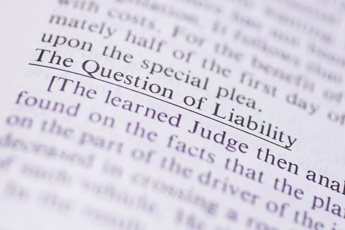Product liability cases come under personal injury when defective products cause injury to a person and bring medical expenses and result in lost wages. These injuries need to be evaluated via a medical records review to obtain accurate details of the injury and the medical care provided, which are vital to the case. Often, there exists confusion between personal injury and product liability which can be cleared by understanding the components of each type of case.
Negligence vs. Strict Liability
Personal injury claims are based on the negligence of another person. Product liability cases, though coming under the umbrella of personal injury, are governed by the rule of “strict liability”. Manufacturers have the obligation to provide a safe product to consumers; however, dangerous products do arrive at the markets or product issues often slip through quality control, and cause harm to users. The major point of divergence between personal injury and product liability is that in a “strict liability” case, the injured person needn’t prove that a manufacturer/employee made a mistake or was negligent whereas in other types of personal injury cases, the plaintiff has to prove that the other party was “negligent” or made a mistake. In a product liability case, you have to prove that:
- The product was defective in some way. It has an “unreasonably dangerous” defect that caused the injury.
- You used the product as instructed. The product had not been altered in any way from the condition in which it was sold.
- You suffered an injury during routine use of the product.
- The injury was directly due to the use of the product.
Types of Product Liability Claims
4 typical product liability claims could be:
- Negligence
- Strict liability
- Breach of warranty
- Consumer protection claims
Particular elements have to be proven in each of the above liability claims before the claim can be considered successful. According to Section Two of the Restatement (Third) of Torts: Product Liability, three major liability claims are:
- Manufacturing defect
- Design defect
- Failure to warn or marketing defect
A time period applies in product liability cases, with most states having laws that limit how long after the product has been sold to the public that the manufacturer/seller can be subject to liability laws. Typically, this time limit varies from 6 to 12 years after the initial sale of the product by the manufacturer. To provide evidence regarding the product’s age, you must safely keep all relevant receipts, credit card bills, and registration cards. In addition, make sure that you can prove that you discontinued the use of the product as soon as you became aware of the particular defect.
Where Personal Injury and Product Liability Converge
Coming to personal injury claims, these are a type of tort lawsuit wherein the plaintiff alleges that her injury was caused by a certain type of “negligence.” This injury can be of the body, mind, or emotions. In case “strict liability” applies to your case, any of the following entities can be held responsible:
- The company where you bought or rented the product
- The business where you were supplied with the product to use on the business’ premises
- The product manufacturer.
The cumulative index of Consumer Reports provides information on the safety and performance of consumer products. This is a very useful resource, and if you can find evidence of personal injury claims for the particular product that injured you, those reports would act as strong support to establish the “unreasonably dangerous” and defective nature of the product. If a defective product causes an injury, you must obtain immediate medical attention, because any medical record from the Emergency Room will add more credibility to your case. This record, upon a medical chart review, should accurately represent your injuries.
To take an example, injuries caused by airbags that don’t deploy correctly could lead to a product liability /personal injury case. You may find it difficult to hold the manufacturer responsible, because they may use legal language that can absolve them in case the devices malfunction. Though they create the impression that the airbags will deploy if they are involved in a serious car crash, they very rarely make guarantees regarding when the airbags will deploy. Typically, you never get to see statements such as, “If you are involved in an accident while travelling at a speed of more than 20 mph, your airbag will deploy.” This is why most product liability cases involving personal injury require experienced lawyers. Utilizing a comprehensive medical records review and evaluation of police reports related to your accident, the attorney will be able to evaluate and demonstrate your situation and the extent of injuries you sustained. Other items reviewed include the information the car manufacturer provides regarding the efficiency of their airbag system. Expert witnesses may be consulted to help determine whether your airbag should have worked in that specific situation. You can reinforce your product liability case if the expert witness can testify, based on the details of your accident, that the airbag should have deployed.
To conclude, consumers purchase products believing that the product they have invested their money in will function properly. There are specific laws and regulations in place to reassure consumers that the products they buy have been tested and approved. Even so, product liability and personal injury claims arise frequently. The differences between product liability claims and other types of personal injury claims lie in the way in which plaintiffs can establish the financial liability of the responsible party.




